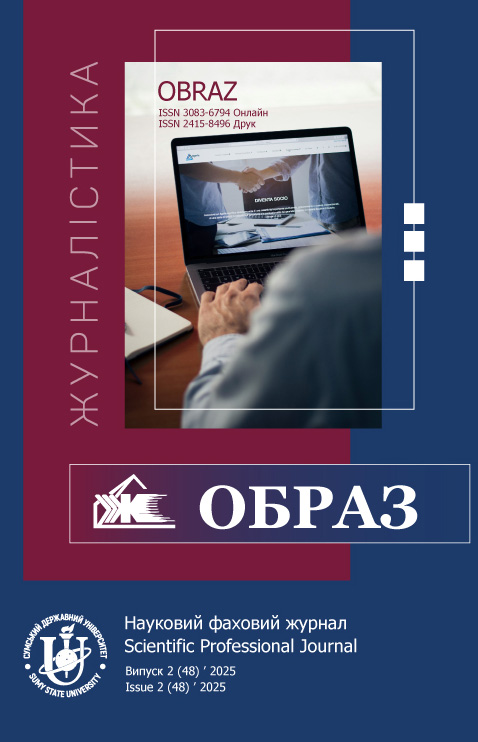Abstract
Introduction. This paper addresses the significance of video book trailers in the educational process of training future media professionals, as they offer an opportunity to integrate multiple educational and professional programs through original video content.
Relevance and Purpose. The article emphasizes that, as a cross-media product, video book trailers hold professional relevance in understanding current trends in screen culture for publishers, advertisers, producers, journalists, cinematographers, screenwriters, directors, and television presenters.
Methodology. By combining metric tracking methods, content analysis, and interview and communication techniques, the study proposes approaches and methods that can be applied in the educational process and used by students from various educational and professional programs to create successful video book trailers.
Results. A classification of video book trailers is proposed, integrating insights and practices from previous studies and clarifying the criteria related to sound, visuals, content, and form in their creation. The classification also highlights different types of video book trailers, forming a typology based on the theory and practice of broadcast journalism, cinematography, and audiovisual arts. Special attention is given to the monetization of video book trailers as one of the key concepts in media education, focusing on the skills and abilities required to transform book visualization into a source of income. The process of creating visual images, scenes, and characters that convey a book’s events, atmosphere, and content becomes an economic indicator, a source of profit, a competitive advantage, and a process of converting creativity into monetary value.
Conclusions. Video book trailers also serve as a means of promoting the students themselves as authors. They are an effective tool for future media professionals to find employment with television or radio companies, YouTube projects, or online radio studios. Video book trailers demonstrate students’ ability to think audiovisually, apply advanced audio-video technologies in content production, and reach their target audience by distributing their work on social media and video-sharing platforms.
References
1. Conference Ics (2014). [Book Trailer as a Means of Book Promotion]. Available at: https://www.researchgate.net/publication/316935451_Buktrejler_ak_zasib_prosuvanna_knigi [Accessed 27 July 2023].
2. Fijriani, N. (2020). Book Trailer “Nawung, Puteri Malu dari Jawa” with Pop-Up Projection Mapping Technique. Available at: https://www.researchgate.net/publication/341076378_Book_Trailer_Nawung_Puteri_Malu_dari_Jawa_Dengan_Teknik_Pop-Up_Projection_Mapping [Accessed 27 July 2023].
3. Grøn, R. (2014). Literary Experience and the Book Trailer as Intermedial Paratext. Available at: https://www.academia.edu/27648655/Literary_experience_and_the_book_trailer_as_intermedial_paratext [Accessed 27 July 2023].
4. Tabernero-Sala, R., Colón-Castillo, M.-J. et al. (2022). Promoción de la lectura en la sociedad digital. El book-trailer del libro ilustrado de no ficción como epitexto virtual en la definición de un nuevo discurso. Available at: https://www.researchgate.net/publication/359573337_Promocion_de_la_lectura_en_la_sociedad_digital_El_book-trailer_del_libro_ilustrado_de_no_ficcion_como_epitexto_virtual_en_la_definicion_de_un_nuevo_discurso [Accessed 27 July 2023].
5. Vardanian, M. (2018). [Book Trailer as a Means of Increasing the Reading Activity of Future Primary School Teachers in Teaching Children's Literature]. Available at: https://www.researchgate.net/publication/331401675_BUKTREJLER_AK_ZASIB_PIDVISENNA_CITACKOI_AKTIVNOSTI_MAJBUTNIH_UCITELIV_POCATKOVOI_SKOLI_U_NAVCANNI_DITACOI_LITERATURI [Accessed 27 July 2023].
6. Voigt, K. (2013). Becoming Trivial: The Book Trailer. Available at: https://www.researchgate.net/publication/276376055_Becoming_Trivial_The_Book_Trailer [Accessed 27 July 2023].
7. Vollans, E. (2016). Think of It as a Trailer… for a Book. Available at: https://www.researchgate.net/publication/309624763_Think_of_It_as_a_Trailer_for_a_Book [Accessed 27 July 2023].
8. Yujeong, C., Na-Young, R. (2018). Project-Based Learning in Korean as a Foreign Language: A Study on the Production of Book Trailers and Learners' Responses. Available at: https://www.researchgate.net/publication/325994764_Project-based_learning_in_Korean_as_foreign_language_A_study_on_the_production_of_book_trailer_and_learners'_responses [Accessed 27 July 2023].
9. Zhang, S. (2020). Transforming English as a Second Language Story Readers into Storytellers: Examining Learners' Experiences in a Video Book Trailer Project. Available at: https://stars.library.ucf.edu/etd2020/161/ [Accessed 27 July 2023].
10. Bilushchak, T., Radkovets, I. (2021). [Book Trailer as Multimedia Advertising in the Promotion of Books by the Author in the Internet Environment]. Available at: https://www.philol.vernadskyjournals.in.ua/journals/2021/1_2021/part_3/42.pdf [Accessed 27 July 2023].

This work is licensed under a Creative Commons Attribution 4.0 International License.

